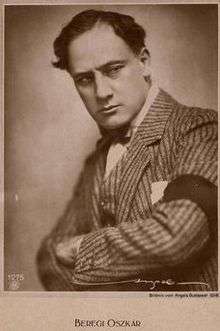Oscar Beregi (actor, born 1876)
Oscar Beregi (born Oszkár Beregi, 24 January 1876 – 18 October 1965) was a Hungarian-Jewish[2] actor who appeared primarily in German films.[3]
Oscar Beregi | |
|---|---|
 | |
| Born | Oszkár Bergeri 24 January 1876 Budapest, Hungary |
| Died | 18 October 1965 (aged 89) Hollywood, California, U.S. |
| Resting place | Woodlawn Memorial Cemetery, Santa Monica |
| Occupation | Actor |
| Years active | 1916-1953 |
| Children | Oscar Beregi Jr. Lea Beregi[1] |
Biography
Beregi was born in Budapest, Hungary, and was the father of actor Oscar Beregi Jr.
Beregi acted on stage in Hungary for 21 years.[4] In April 1920, as "the only Jewish actor of prominence" acting with the Budapest National Theatre, he was the subject of a demonstration that led to the group's changing its program and presenting a play in which Beregi did not participate.[5]
In the early 1920s, Beregi was exiled from Hungary because of his "alleged political activities".[6] During the exile he acted in Vienna for four years.[6] He served as president of the Film Actors' Association of Vienna.[7]
Beregi appeared in 27 films between 1916 and 1953. He is remembered for his performance as Professor Baum in Fritz Lang's film Das Testament des Dr. Mabuse.
In 1926, Beregi signed a five-year contract with Universal Pictures.[8]
Beregi died in Hollywood, California, and was buried in Budapest, Hungary.[3]
Partial filmography
- Ártatlan vagyok! (1916) - Pierre, katonaorvos
- Mire megvénülünk (1917) - Áronffy Lóránd
- Hófehérke (1917) - Balassa Imre mérnök
- The Stork Caliph (1917) - Tábori báró / kikötõmunkás
- A föld embere (1917) - Bán Ferenc, bányamérnök
- Károly bakák (1918) - Epres János
- Az aranyember (Man of Gold) (1919) - Tímár Mihály
- Jön az öcsém ("My Brother is Coming") (1919, Short) - As öcs
- Ave Caesar! (1919) - Alexis gróf, testõrkapitány
- A tékozló fiú (1919) - Wagner Oszkár, a fia
- Meriota the Dancer (1922) - Cesare Borgia
- William Ratcliff (1922)
- Children of the Revolution (1923)
- Das verbotene Land (1924)
- Vier Nächte einer schönen Frau (1924)
- Die Tragödie einer Frau (1924)
- Die Sklavenkönigin ("The Moon of Israel", lit. "The Queen of the Slaves") (1924) - Amenmeses
- Jiskor (1924) - The Count
- Ssanin (1924) - Wladimir Petrowitsch Ssanin
- Das Gift der Borgia (1924)
- The Curse (1925) - Jehuda Nachmann
- The Love Thief (1926) - Prime Minister
- The Flaming Forest (1926) - Jules Lagarre
- Camille (1926) - Count de Varville
- Butterflies in the Rain (1926) - Lord Purdon
- The Woman on Trial (1927)
- Der Geliebte seiner Frau (1928) - Polizeikommissär Ralph Förster
- Andere Frauen (1928)
- Povara (1928) - George Stralila
- Love in May (1928)
- Der Dieb im Schlafcoupée (1929)
- Die Jugend am Scheideweg (1929)
- Juwelen (1930)
- A kék bálvány (1931) - Turner ,milliomos
- Ein Auto und kein Geld (1932)
- Kísértetek vonata (1933) - Dr. Stirling
- Das Testament des Dr. Mabuse ("The Testament of Dr. Mabuse") (1933) - Prof. Dr. Baum
- Iza néni (1933)
- Rákóczi induló (1933) - Báró Merlin Ádám,földbirtokos
- Anything Can Happen (1952) - Uncle John
- Tonight We Sing (1953) - Dr. Markoff (uncredited)
- Call Me Madam (1953) - Chamberlain (uncredited)
- Desert Legion (1953) - Si Khalil
References
- Liloo (18 October 2014). "The legend of Isadora Duncan: Oscar Beregi (24 January 1876 – 18 October 1965)". Retrieved 7 January 2017.
- Siegbert Salomon Prawer, Between Two Worlds: The Jewish Presence in German and Austrian Film, 1910-1933, Berghahn Books (2007), p. 213
- Wilson, Scott (2016). Resting Places: The Burial Sites of More Than 14,000 Famous Persons, 3d ed. McFarland. p. 58. ISBN 9781476625997. Retrieved 16 July 2017.
- Magyar, Stephen (22 May 1925). "How Hungary Treats Her Greatest Actor". Wisconsin Jewish Chronicle. Wisconsin, Milwaukee. p. 4. Retrieved 26 May 2018 – via Newspapers.com.

- "Anti-Semitic Demonstration Against Jewish Actor". The Jewish Monitor. Texas, Dallas. IJPB. 23 April 1920. p. 1. Retrieved 26 May 2018 – via Newspapers.com.

- "In the Theaters of Europe". The Brooklyn Daily Eagle. New York, Brooklyn. CTIS. 15 March 1925. p. 68. Retrieved 26 May 2018 – via Newspapers.com.

- "Won Fame in Europe". The Gazette. Canada, Montreal. 22 January 1927. p. 15. Retrieved 26 May 2018 – via Newspapers.com.

- "(untitled brief)". The Atlanta Constitution. Georgia, Atlanta. 9 May 1926. p. 43. Retrieved 26 May 2018 – via Newspapers.com.
